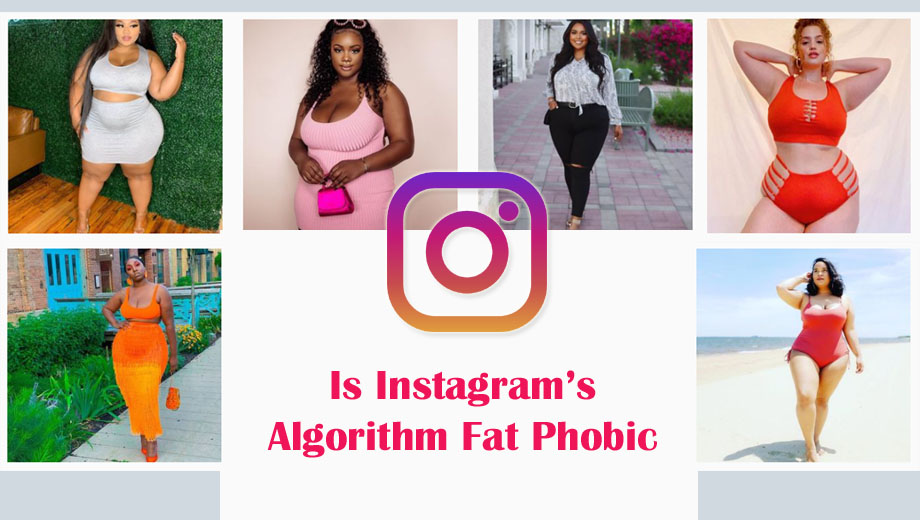Censorship has always been a big issue with Instagram; recently, women with larger bodies have been getting their simple bikini posts censored when the slim ones are not facing the same problems; this is where the question arises, is Instagram’s algorithm fat phobic?
Invisible women
It seems to me that Instagram’s algorithm themselves can be inherently fat-phobic, which makes it extremely dangerous, as fatphobia affects not only mental health but also physical health; many horror stories can be found out on the internet about obese people mistreated and not taken seriously; people need to unlearn these stereotypical things that society has taught then, or otherwise, the plus-size would bear the consequences.
Slim women are like invisible women society looks at them they approve of them, and then never look all that society wants to talk about how an overweight person should eat less and match up to the beauty standards they have created any minor natural imperfection, and millions of people could sit and talk about how to get rid of it or how ugly it is; it is just so disturbing to think that still, people have not stopped obsessing over their petty little beauty standards in the 21st century.
#curvy can no longer happen
The fatphobic guidelines were proven true by Instagram itself when they removed the #curvy. And yes, that is absolutely true when you search the #curvy, a very complex message with a simple sentence will pop onto your screen “no photos or videos,” making you think why would that be when hashtags like #skinny and #thin are still allowed, and as are heinous hashtags #bitch and #dildos and the Instagram has given a reason that #curvy propagates too much skin.
Is this something new?
And the best answer to this question will be no, absolutely not; these things have been in light since 2014; everybody knew it, but nobody gave attention to it or talked about it; it first come to light when a 19-year-old college student from Ohio, Samm Newman posted pictures of herself in a bikini but a week later Instagram suspended her account for violating the app’s community guidelines. Still, Newman alleged that the site did it because she’s overweight, stating to NBC4i that fat is not a bad word; the teen took several actions. Other women supporting her coming up with hashtags like #bodylove #pizzasister4lyfe; these events continued. Then a few years later, the site took down her account.
After NBC4i’s report on Newman, Instagram revoked the suspension of her account and apologized for their mistake and for causing any inconvenience; As for Samm Newman, she planned to keep on defending the beauty norms and being proud of their size and shape, and to this date, she’s still an activist.
Shadow-banning
Shadow-banning refers to when specific content is not squarely removed from the site but diplomatically hidden from users. Shadowbanning unable users from searching shadow-banned hashtags and removing similar content from the site’s explore page.
And this censorship of specific communities taking pride in their beliefs about body and sexuality is a step backward, generally implying that people who fall outside the body and gender norms they have created are bound to be ashamed of what they look like and who they are.
The only explanation Instagram has given of this is how this method deprioritized sexually suggestive images, and the practice of this has been growing so regular part of the app’s far-reaching breakdown on what it believes otherwise is “sexual content.”
When we talk about nudity, Instagram has always been straightforward about its policies its community guidelines stating that digitally created sexual content, genitals, or fully-nude closeups are not allowed but what we don’t know is beyond outright banning of nude images, Instagram uses this in a far hazy way censoring content that reclines in a grey area and is described as “sexually suggestive.”
Inappropriate
When images of Fully clothed obese or black/brown women are eliminated for not being appropriate, the sites ai learners choose biases, arguments, misogyny, or racism, creating barriers for a particular group of people in the digital world; it is disturbing to think social platform which is known for a powerful equalizing force serves to keep down the communities who are often mistreated offline and they will keep doing it flagging plus-sized profiles under the terms like excessive nudity or sexual solicitation. They will keep pointing out people of color far more than their counterparts; this won’t stop until someones take serious action against these online platforms.
They are straightforwardly implying that clothes or not these body types should be hidden from view in a world that already pushes innocent people to their edge just for their natural body types and imperfections; speaking back against body shaming and censorship is a crucial need now.
Instagram has also started shadow-banning pole dance videos and images or taking down the posts. We all know how much this must be hindering the content creators from promoting their work, thus having a tangible effect on their earning potential.
Shadow-banning perhaps is the most frustrating thing about their algorithms as it leaves the users confused as to what is appropriate, What isn’t punishing them in a way that seems indiscrimination but is inevitably discriminative; the denial to define what it means to be “sexually suggestive adequately” and the unwillingness to acknowledge the hint around it, is brutally unfair.
And the vital question here is how we can protect people online and distinguish between the content that is sexual rather than a protest is still not answered. Nonetheless, we know that in this era of fake news flood, body-positive women online aren’t anything to be afraid of.
The new mind
It might take time, but upcoming generations will surely be able to make a significant change in this discriminative community. As this generation has started a moment against traditional beauty ideals, it surely will continue and become a mass movement. until then, all we can do is protect those who are being wronged.
Individuals are enthusiastic about challenging beauty ideals and welcoming variety in appearance and body types. Unique features are regarded in a positive light, not as something that isn’t considered attractive.
People with Different skin or any physical disease involved with appearance are being supported and called beautiful; there are some people who still promote weight loss and idealize thinness as beauty, but soon they will be outnumbered.
The very motivating thing about body positivity is that inner positivity was the most common body-positive theme on the site, mainly focusing on toughness, the ability to last, and not giving up.
In conclusion
At last, I would suggest Instagram’s algorithm is not helping anyone and needs action against it as soon as possible; like stated above,
- The algorithm does not only discriminate against diversity but also have effects on the income of content creators.
- obese or overweight is not “sexually suggestive” or inappropriate.
- Shadow banning goes hand to hand with misogyny and racism and against diversity.
- This has been in light since 2014 and maybe even before that.
- heinous hashtags exist like # dildos or #skinny while curvy can no longer happen.
Isn’t it disturbing when you see such significant communities doing small-minded things like these? Just remember that you have to fight your fights and thus to speak when you see content that idealizes the traditional beauty standards while body-shaming the plus-sized or people with color it is essential to take action or Instagram would keep flagging the beautiful plus size women as inappropriate or shadow banning talented contend, creators, just because they disapprove of them People just need to understand that living peacefully in diversity is so much better than calling out other people for being naturally different from their beauty standard and prominent social media platforms like Instagram supporting them by having a fatphobic algorithm.

